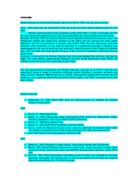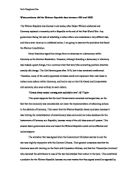The next problem the government faced was dealing with the two extremist groups – right wing nationalists on one end of the scale, and left wing communists on the other. A number of uprisings were held, mainly in Berlin.
The left wing communists wanted a full scale revolution (like in Russia 1917). The ‘Spartacist League’ was set up by Rose Luxemburg and Karl Liebknecht and were generally supported by the working people (who they though Ebert wouldn’t help). In Jan. 1919 workers protests begun, so they took this as a chance to begin a revolution. They took over newspaper and telegraph headquarters, hoping the other protesters would join in and take over other buildings – unfortunately for them, they didn’t. The Army, helped by the Freikorps were to stop the uprising. Over 100 workers were killed with no success for the Spartacist League. It was extremely badly planned and they got no support from the other left wing parties. The two founders (Luxemburg and Liebknecht) were viciously murdered and dumped in a canal! Another example of left wing extremists attempting a revolution was in 1920 – the Red Rising in the Ruhr. Again these were workers led by a communist party. They joined the group because they were angry and annoyed over bad pay and conditions, leading to protests. A communist army (red army) of 50000 possessed the Ruhr region of Germany and took control of raw materials. Yet again the German army, with help from the Freikorps stopped the rising, killing over 1000 workers. Again there was no real success. There was weak leadership and again no clear plan or support. There were many demonstrations and strikes over the next few years but they imposed no real threat.
The Freikorps (who were helping the German army defeat the left wingers) are an example of a right wing group. These were ex-military and set up by Wolfgang Kapp. They wanted the total opposite to what the left wing communists wanted – they wanted one leader – a dictatorship. They were mainly the people in power – those of a higher class. In 1920 the government ordered them to break up, as they saw them as a threat. Their help was no longer needed, as the risk from the left wingers was crushed. The Kapp Putsch started when, ignoring the government, 12000 Freikorps marched into Berlin scaring off the Government allowing the Freikorps to put Kapp forward as the new leader of Germany. The Freikorps were now in charge, nevertheless there was still not much support, and even more workers went on strike because they disapproved of them so much. After only four days in charge, Ebert’s government came back into power. There was another revolt in November 1923, at the time when hyperinflation was at its worst. It was named the Munich Putsch and was lead by the Nazi party, headed by Adolf Hitler and Ludendorff (a WW1 hero also involved in the Kapp Putsch). Their support had grown from around 6000 to 55000 members in 1923 and they had a private army (named the ‘SA’ – storm troopers - lead by Ernst Rohm). They believed democracy was weak, and that there should only be one leader, and so they wanted to take over the government and put Ludendorff in charge. Hitler, along with 600 of the SA burst into a meeting where Kahr (Bavarian leader) was speaking and forced him to support their plan. Again this was not properly planned, and not long after Kahr withdrew his support. The German army fought the Nazis, leading to the death of 14 Nazis. The leaders were arrested – including Hitler who was sent to jail for 5years (even though he only served 9months).
Problems, of course, arose from the signing of the Treaty of Versailles, 1919. Aspects of this affected Germany greatly. It was split in two, allowing Poland direct access to the sea. The Rhineland was demilitarised. The army was reduced to 100000 as well as the navy being reduced to 15000 with only 6 battleships – the rest of their battleships were to be given to the allies but Germany chose to sink them instead of surrendering them. Germany was to take full responsibility (‘war guilt’) for the war and pay reparations to the other countries (no set amount had yet been decided). Other aspects of the Treaty included 15% of agriculture being lost, as well as 10% of industry being lost.
No one in Germany seemed to support the agreement. The working class who had suffered greatly in the war generally supported Ebert and the social democrats. Most ordinary Germans were still very patriotic and proud of Germany, so you can imagine they would have taken the loss of the war badly, and found the Treaty of Versailles completely unfair. The loss of industry probably would have meant a large loss of jobs for working class people too. The Extreme nationalists (Nazi’s for example) believe the war shouldn’t have been ended as they had believed they could win all along. These were the people most likely to believe they had been ‘stabbed-in-the-back’ when ‘cowardly’ politicians (November criminals as named by some) ended the war in Nov. 1918. They were extremely proud of Germany and didn’t want to believe they had been defeated – the Treaty of Versailles would then take away Germany’s strength and pride; these extremists would completely hate it! The social democrats (including Ebert) saw that the signing of the treaty was necessary. Of course they wouldn’t have liked it, but they feared that the allies would re-start the war, and I would assume this would completely devastate Germany.
When the final amount for reparations was set in 1921 at £6600million Germany declared they didn’t have enough money to pay, though most of the allies thought they were lying to get out of paying. They managed to pay the first £50million payment in 1921, but when the next payment was due in 1922 the government failed to pay. After this French and Belgium troops occupied the Ruhr (an industrial area in Germany) and used force to take raw materials and goods. The government then encouraged workers here to use passive resistance (hold strikes) so there would be no raw materials for the allies to take. To this the French reacted badly and 100 workers were killed. Though the passive resistance meant France and Belgium had nothing to take, it also meant Germany had no trade – getting them even further into debt. And so, more money was printed to pay debts, though it wasn’t long until people realised the money was worthless!
Hyperinflation had begun; millions and millions of marks were printed as things started to completely swerve into madness. Previous to this $1 had been worth 9marks; but by Nov. 1923 when hyperinflation had reached its worst, $1 was worth 200billion marks. Workers collected money and threw it out of the windows to family so they could run to the shops – hoping to get there before a queue had formed (considering prices could change in the time it took to get from the back of the queue to the front). This insanity caused great difficulty for many people. Anyone on benefits (including pensioners and single parents) would have been in great difficulty – the amount would have been fixed and no way would that amount have gone up as quickly as the hyperinflation! Factory workers would have begun to be paid everyday and their bosses would have attempted to keep up with the inflation – often they would take wages home in wheelbarrows and then if they went into a shop leaving their wheelbarrow containing millions, if not billions of marks outside it would be more likely that the wheelbarrow was stolen – the money left on the floor. Someone who had saved up money which they were now living on would be in a terrible state. They may have had savings large enough to buy a house in 1920, but now they couldn’t even afford a loaf of bread. There are a few examples of people who would gain from the inflation. Anyone who had debts or loans in 1920 would easily be able to pay these off now – leaving them with something much more valuable – possibly land or a house etc. The disaster that was hyperinflation desperately needed to be solved. A new leader was brought in – Gustav Stresemann, he brought new support to the government (he was a leading member of every govt.). He decided that marks needed to be destroyed – so he came up with the Retenmark to start the end of the hyperinflation crisis. To help rebuild industry, Germany acquired loans of around 800million marks from the USA under the ‘Dawes Plan’ and passive resistance was called off. With time Germany’s political status was rebuilt, the economy was under control, and eventually they became accepted by the rest of Europe again.







